|
|
|
Sort Order |
|
|
|
Items / Page
|
|
|
|
|
|
|
| Srl | Item |
| 1 |
ID:
106462
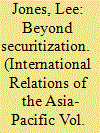

|
|
|
|
|
| Publication |
2011.
|
| Summary/Abstract |
Since the late 1980s, the scope of security policy has widened dramatically to encompass a wide range of 'non-traditional' threats. Southeast Asian states have superficially appeared to embrace this trend, broadening their security discourse considerably. However, they are also often criticized for failing to translate this discursive shift into concrete regional cooperation to tackle these new threats. This article critiques the dominant theoretical framework used to explore the widening of states' security agendas - the Copenhagen School's 'securitization' approach - as unable to account for this gap due to its fixation on security discourse rather than practice. Drawing on state theory and insights from critical political economy, the article argues that the scope of regional security policy is better accounted for by the distinctive nature of state-society relations within Southeast Asia. The argument is advanced using case studies of Southeast Asian states' policies toward Burma, environmental degradation, and border conflicts.
|
|
|
|
|
|
|
|
|
|
|
|
|
|
|
|
| 2 |
ID:
106461
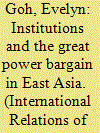

|
|
|
|
|
| Publication |
2011.
|
| Summary/Abstract |
This article argues that in the post-Cold War strategic transition in East Asia, ASEAN has helped to create a minimalist normative bargain among the great powers in the region. The regional norms propagated through the 'ASEAN way', emphasizing sovereignty, non-intervention, consensus, inclusion, and informality were extremely important in the initial stages of bringing the great powers - especially China and the United States - to the table in the immediate post-Cold War period. During this time, ASEAN helped to institutionalize power relations legitimizing the role of the great powers as well as the 'voice' of smaller states in regional security management. But the process of institutionalizing great power relations contains further steps, and what ASEAN has achieved is well short of the kind of sustained cooperation on the part of the great powers that is so necessary to the creation of a new stable regional society of states. Moreover, ASEAN has provided the great powers with a minimalist normative position from which to resist the more difficult processes of negotiating common understanding on key strategic norms. At the same time, ASEAN's model of 'comfortable' regionalism allows the great powers to treat regional institutions as instruments of so-called 'soft' balancing, more than as sites for negotiating and institutionalizing regional 'rules of the game' that would contribute to a sustainable modus vivendi among the great powers. As such, ASEAN's role is limited in, and limiting of, the great power bargain that must underpin the negotiation of the new regional order. This is a task that the regional great powers (the United States, China, and Japan) must themselves undertake.
|
|
|
|
|
|
|
|
|
|
|
|
|
|
|
|
| 3 |
ID:
106460
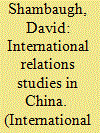

|
|
|
|
|
| Publication |
2011.
|
| Summary/Abstract |
International relations (IR) studies in China have developed considerably over the past three decades. The field is now well established with 49 degree-granting institutions, as well as a series of 'think tanks' that produce policy-related analyses of international issues. Recent survey research of publication trends in the field reveals a significant new diversity of research subject areas, with an increased emphasis on topics associated with Western 'liberal' IR theory and international political economy, while at the same time revealing a tenacity of 'realist' topics such as major power relations. While the quantitative dimensions of the field have grown dramatically - institutions, faculty, publications - the overall quality of research remains very uneven across China and generally weak when compared internationally. This article surveys the historical development of the field, summarizes the current state of the field, and identifies challenges and opportunities for future development.
|
|
|
|
|
|
|
|
|
|
|
|
|
|
|
|
| 4 |
ID:
106465


|
|
|
|
|
| Publication |
2011.
|
| Summary/Abstract |
This study introduces new quantitative text analysis methods into foreign policy analysis. Quantitative text analysis in the social sciences is currently aimed in two directions, namely (a) more systematic analysis using larger amounts of data sets and (b) more detailed analysis using linguistic knowledge. Our methods, by using recent techniques in natural language processing, integrate these two different trends, and achieve more systematic but detailed analysis. We apply our methods to 147 Diet speeches of Japanese prime ministers, and shed new light on the character of Japanese foreign policy. This study makes a methodological contribution to foreign policy analysis and a substantial contribution to the study of Japanese foreign policy.
|
|
|
|
|
|
|
|
|
|
|
|
|
|
|
|
| 5 |
ID:
106466
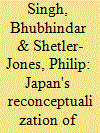

|
|
|
|
|
| Publication |
2011.
|
| Summary/Abstract |
Japan has steadily extended its military reach from a domestic zone of defense against territorial invasion in the late 1950s, through regional security policy in the late 1970s to what has now become a globally scaled military role. This re-expansion is perceived by some as evidence of revived militaristic ambitions, and by others as subservience to the US global strategy. However, taking the cue from Japan's 2004 National Defence Programme Guideline (New Taiko), this paper assesses the role globalization has played in this territorial expansion. The impact of globalization is evident in the double expansion of Japan's national security conception in geographical terms and self-defense forces roles in global security. These 'expansions' are studied through two key elements of globalization - the deterritorialization of complex relations of interdependence between states (security globality) and the inter-penetrating nature of these relations blur the boundary between foreign and domestic spaces (intermestic space).
|
|
|
|
|
|
|
|
|
|
|
|
|
|
|
|
| 6 |
ID:
106464
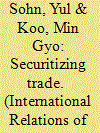

|
|
|
|
|
| Publication |
2011.
|
| Summary/Abstract |
The Korea-US free trade agreement (KORUS FTA) of 2007 clearly shows how countries simultaneously pursue economic benefits and strategic interests in trade negotiations. This study argues that the surprise launch and the successful conclusion of the KORUS FTA illustrate the joint efforts by the United States and the Republic of Korea to re-securitize their bilateral economic relations. Security and strategic calculations held by top policy-makers on both sides catalyzed the official launch of FTA negotiations by removing a number of longstanding trade irritants such as Korea's screen quotas and ban on US beefs. At the post-negotiation stage, however, the lack of bipartisanship-particularly in the United States-to provide trade liberalization for their allies in favor of their own broader strategic interests has led to the legislative stalemate of executive efforts at re-securitization of trade relations. This study concludes that the stalemated ratification process shows the erosion, not the strength, of US power to provide security and trade liberalization as public goods.
|
|
|
|
|
|
|
|
|
|
|
|
|
|
|
|
|
|
|
|
|